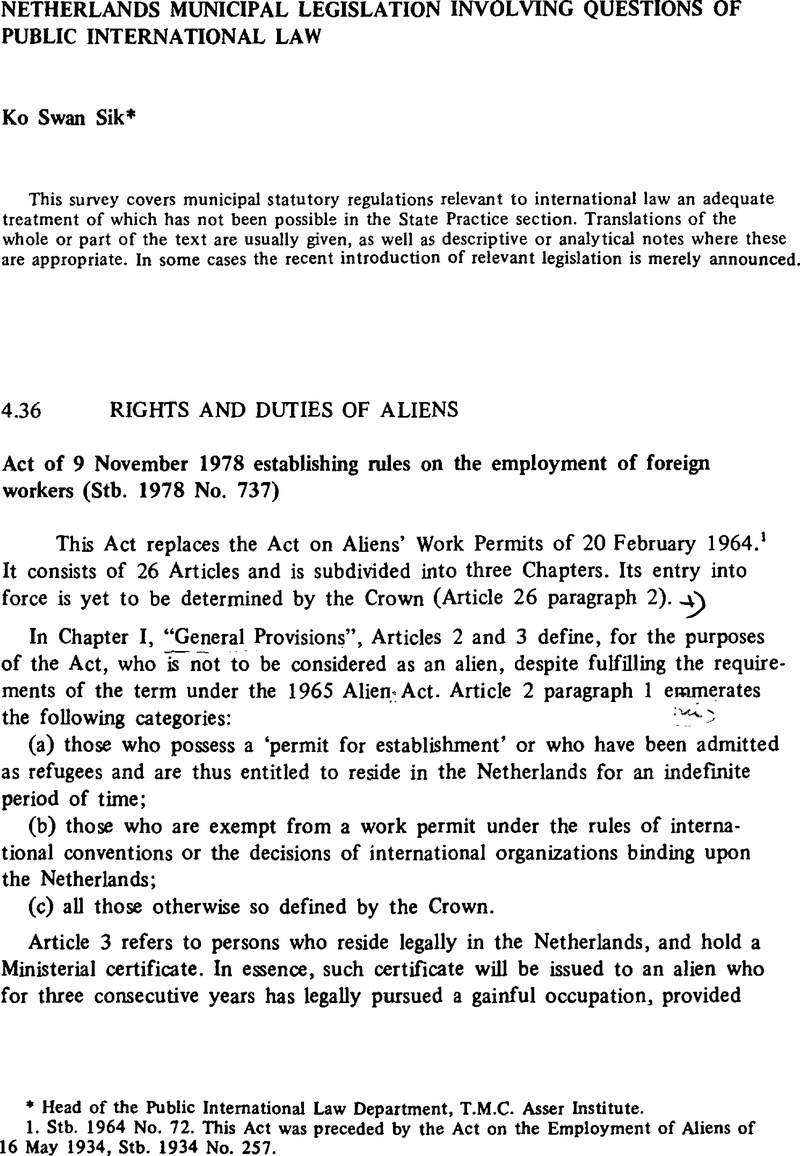No CrossRef data available.
Article contents
Netherlands municipal legislation involving questions of public international law
Published online by Cambridge University Press: 07 July 2009
Abstract

- Type
- Documentation
- Information
- Copyright
- Copyright © T.M.C. Asser Press 1979
References
1. Stb. 1964 No. 72. This Act was preceded by the Act on the Employment of Aliens of 16 May 1934, Stb. 1934 No. 257.
2. Art. 3 elaborates on procedure.
3. Here is one of the main differences from the 1964 Act: employment permits for the employer instead of work permits for the worker. See for ananalysis of these differences, Groenendijk, C.A. and Swart, A.H.J., “De teweikstelling van buitenlandse werknemers” [The employment of alien workers], N.J.B. 1976 pp. 317–343.Google Scholar
4. These grounds are more extensive than those in Art. 4 of the 1964 Act.
5. The so-called “permits ceiling”, see infra. This ceiling was unknown to the 1964 Act.
6. See 1 NYIL (1970) p. 247.
7. Act of 29 June 1851, Stb. 1851 No. 85, as revised.
8. Before the amendment of the Municipalities Act by the Act of 24 December 1970 (Stb. 1970 No. 608) the provision was numbered Article 289. In that period the Royal decree of 13 May (1957 (Stb. 1957 No. 173) dealt with the exemption from municipal taxes in favour of diplomats, career consular representatives and other representatives of foreign Powers, and of persons who, being representatives or officials of international organizations, were, under international law or in accordance with international custom (Krachtens het volkenrecht of overeenkomstig het internationaal gebruik), entitled to the privilege of exemption from taxes, including exemption from any local tax (Arts. 1 and 5 of the Decree). The 1957 Decree lapsed upon the entry into force of the 1970 modification of the Municipalities Act, which now assigns the Ministers of the Interior and of Finance to implement the statutory provision instead of the Crown. The 1957 Royal Decree was preceded by the Royal Decrees of 5 June 1822, 19 June 1877 (Stb. 1877 No. 151) and June 1885 (Stb. 1885 No. 129) which were all repealed by the 1957 Decree.
9. According to the Explanatory Note to the Decree, which was published together with the Decree itself, the formulation of Art. 1 has been borrowed from the 1957 Decree (see supra, n. 8) and from Art. 25 of the Decree for the Implementation of the 1964 General Act on State Taxes, published in Nederlandse Staatscourant 1964 No. 253. The Note recalls, inter alia, that the exemptions under the 1957 Royal Decree are as much as possible maintained in the present Decree. The Note also recalls that one of the differences is to be found in the fact that under the 1957 Decree exemption was granted from the now repealed “Paying guest tax” (logeergastenbelasting), while the present Decree does not grant a similar exemption from the Tourist tax under Art. 276 of the Municipalities Act.
10. According to the Explanatory Note this differs from the 1957 Decree. While the 1957 Decree refers solely to individuals, the present Decree distinguishes between persons and missions. The Note refers to Art. 28 of the 1960 Tariffs Decree (Stb. 1960 No. 30) for a similar distinction.
11. The Explanatory Note contains the following passage: “The term ‘diplomatic and consular representatives’ refers to ambassadors, envoys, councillors, secretaries, attachés and officials otherwise called, and also to career consuls, comprising consul-generals, consuls and vice-consuls. The term ‘officials attached’ refers to all other personnel employed by a mission representing another Power and being salaried by it, and fulfilling the requirements of Article 1, paragraph 2, sub-paragraphs (a) and (b)”.
12. Stb. 1978 No. 158.
13. The general considerations which have led to the modifications are included in the explanatory memorandum to the amendment bill, Bijl. Hand. II 1976/77 – 14272 (R. 1055).
14. Royal Decree of 15 September 1956, Stb. 1956 No. 484, being an implementation of the Consular Act.
15. Stb. 1978 No. 611.
16. Stb. 1978 No. 612.
17. Stb. 1978 No. 159.
18. Act of 5 July 1962, see 8 NYIL (1977) p. 331.
19. Stb. 1966 No. 289.
20. Decree on the Import and Export of Goods from and to Southern Rhodesia, Stb. 1968 No. 620.
21. Act of 26 January 1961, Stb. 1961 No. 31
22. Trb. 1972 No. 84. The Agreement is subject to ratification.
23. These are “claims relating to cargoes which were arrested in ports of the former Italian territories in Africa during the Second World War, and which were subsequently lost as a consequence of the war, and claims relating to cargoes on board the Italian ships “Anfora” and “Fusyama” at the time of commencement of the war, which were also lost”.
24. Art. 1 reads, inter alia:
“(a) The Government of the Italian Republic shall pay, in full and final settlement of the claims for compensation referred to in Article 2 to the Government of the Kingdom of the Netherlands the sum of one million Dutch guilders.
(b) …”
25. Act of 7 November 1910, Stb. 1910 No. 313, text incorporating the most recent modifications in Stb. 1977 No. 619.
26. Convention of Munich, 5 October 1973, Trb. 1975 No. 108.
27. Treaty of Washington, 19 June 1970, Trb. 1973 No. 20. This Treaty obtained parliamentary approval by Act of 13 December 1978, Stb. 1978 No. 707.
28. The so-called EEC Execution Treaty, Trb. 1969 No. 101.


